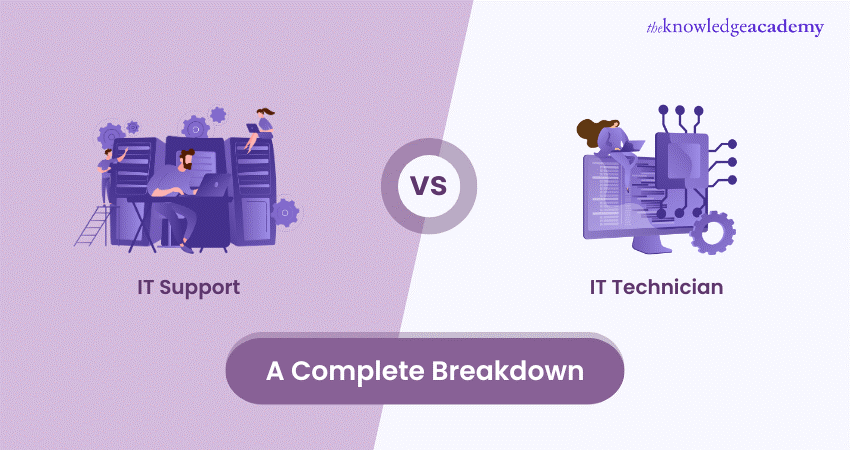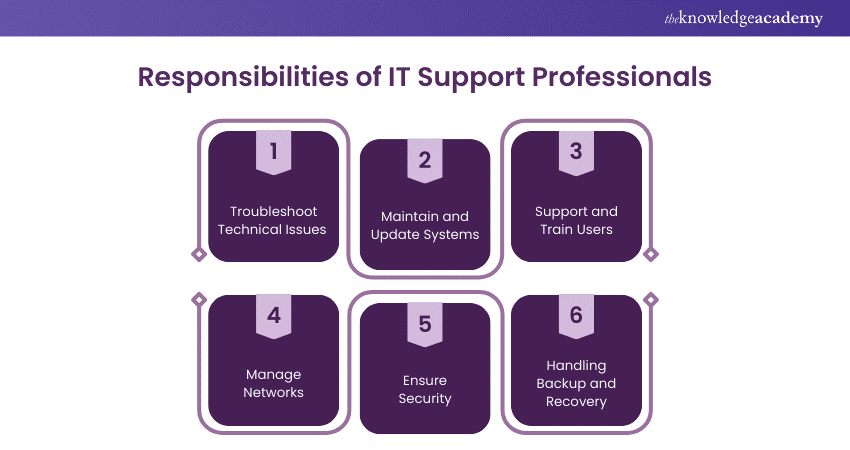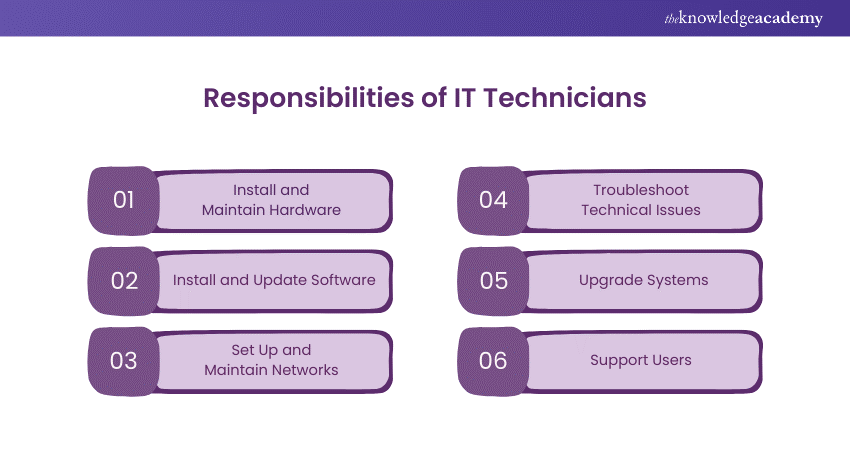We may not have the course you’re looking for. If you enquire or give us a call on +44 1344 203 999 and speak to our training experts, we may still be able to help with your training requirements.
We ensure quality, budget-alignment, and timely delivery by our expert instructors.

In today’s tech-driven world, IT Support and IT Technicians are the unsung heroes behind smooth business operations, each with distinct roles and responsibilities. While IT Support Specialists proactively maintain systems to prevent issues, IT Technicians swiftly address problems as they arise in businesses and organisations. Understanding these roles not only equips your business with the right expertise but also keeps your tech ecosystem thriving. Dive into the captivating IT Support vs IT Technician showdown as we explore their unique facets and intriguing differences.
Table of Contents
1) What is an IT Support?
a) The Significance of IT Support
b) Core Responsibilities of IT Support
2) What is an IT Technician?
a) The Significance of IT Technician
b) Core Responsibilities of IT Technician
3) When Do You Need an IT Technician?
4) Conclusion
What is an IT Support?
IT support refers to the services provided to assist individuals and organisations in managing and maintaining their technology systems. It includes troubleshooting, software installation, and network management, ensuring smooth IT operations and resolving technical issues as they arise.
The Significance of IT Support
The IT support professionals play a crucial role in the smooth functioning of any organisation’s technology infrastructure. Here are key reasons why IT support is important:
a) Ensures System Uptime: IT support minimises downtime by quickly resolving technical issues and ensuring continuous business operations.
b) Enhances Productivity: They help maintain high productivity levels by promptly addressing and preventing problems.
c) Protects Data: IT support includes safeguarding sensitive data through security measures and reducing the risk of breaches.
d) Facilitates Seamless Operations: They support smooth daily operations by managing and maintaining essential IT systems.
e) Supports Business Growth: IT support enables businesses to focus on growth and strategic initiatives by keeping technology running efficiently.
Core Responsibilities of IT Support
IT support professionals play a vital role in ensuring an organisation's smooth and efficient running of their IT systems. Here are the core responsibilities of IT support:

a) Troubleshoot Technical Issues: IT support professionals diagnose and resolve hardware and software issues to ensure minimal disruption to operations.
b) Maintain and Update Systems: They regularly maintain and update systems to prevent potential issues.
c) Support and Train Users: IT support professionals assist users in effectively using technology and often provide training to improve user competency.
d) Manage Networks: They monitor network systems to ensure secure and reliable connectivity.
e) Ensure Security: IT support professionals implement and update security protocols, protecting systems from cyber threats and unauthorised access.
f) Handling Backup and Recovery: They manage data backup processes and implement recovery solutions to prevent data loss in case of system failures.
Become a hardware expert with our Computer Hardware Troubleshooting Course- sign up now!
Essential Tools for IT Support
IT support professionals use various tools to manage and maintain an organisation’s technology infrastructure effectively. Here are some essential tools for IT support:
a) Remote Desktop Software: These tools enable IT support professionals to access and troubleshoot user issues remotely.
b) Network Monitoring Tools: They help monitor network performance, identify issues, and ensure secure, stable connectivity.
c) Help Desk Software: These tools allow IT support professionals to manage user requests and technical issues, streamlining the support process.
d) Antivirus and Security Software: They protect IT systems against malware and cyber threats.
e) Backup and Recovery Solutions: These tools help IT support professionals perform regular data backups and quickly restore data in case of failures.
f) System and Application Management Tools: They allow IT support professionals to deploy, update, and maintain software efficiently.
Business Advantages of Utilising IT Support
IT support offers significant business advantages, including enhanced productivity through quick issue resolution, reduced downtime, and streamlined operations. It ensures data security with proactive monitoring and threat management.
Additionally, IT support provides expert guidance on technology upgrades, helping businesses stay competitive and efficient, ultimately leading to cost savings and improved overall performance.
Build Your networking skills – join the Introduction To Networking Training today!
What is an IT Technician?
An IT technician is a professional who installs, maintains, and troubleshoots computer hardware, software, and networks. This role ensures that an organisation’s technology systems function efficiently and seamlessly.
When Do You Need an IT Technician?
You need an IT technician when your organisation encounters hardware or software issues that disrupt daily operations. They are essential for installing new systems, performing routine maintenance, and troubleshooting problems to restore optimal functionality. Additionally, their expertise ensures that your technology infrastructure remains operational, reducing downtime and preventing major technical issues.
Core Responsibilities of IT Technician
An IT technician's responsibility is to ensure that all systems function optimally and that users have the necessary tools to perform their tasks efficiently. Here are the core responsibilities of an IT technician:

a) Install and Maintain Hardware: IT technicians set up, configure, and maintain computer hardware, including desktops, laptops, and peripheral devices.
b) Install and Update Software: They install, update, and troubleshoot software applications to ensure they function correctly and efficiently.
c) Set Up and Maintain Networks: IT technicians configure and maintain network infrastructure, including routers, switches, and cables, to ensure stable connectivity.
d) Troubleshoot Technical Issues: They diagnose and resolve technical issues related to hardware, software, and networks to minimise disruptions.
e) Upgrade Systems: IT technicians implement system upgrades, including hardware and software, to keep the organisation’s technology up to date.
f) Support Users: They provide hands-on support, helping them resolve technical issues and offering guidance on technology use.
Optimise your Mac proficiency – Master MacOS Mojave Troubleshooting and Support Training today!
Essential Tools for IT Technician
IT technician needs various tools to effectively manage, troubleshoot, and maintain an organisation's technology systems. Here are some essential tools:
a) Diagnostic Software: IT technicians use diagnostic software to quickly identify and troubleshoot hardware and software issues.
b) Multimeter: They use a multimeter to test electrical circuits and ensure proper power to components.
c) Cable Testers: IT technicians rely on cable testers to verify the integrity of network cables for stable connectivity.
d) Remote Access Tools: They use remote access tools to troubleshoot and support systems from a distance.
e) Data Recovery Tools: IT technicians utilise data recovery tools to retrieve lost or corrupted data.
f) System Imaging Software: They employ system imaging software to create backups for quick system restoration.
Business Advantages of Utilising IT Technician
Employing an IT technician provides businesses with quick resolution of technical issues, minimising downtime and optimised productivity. Their hardware and software management expertise ensures a smoothly running system, reducing the risk of major disruptions.
Additionally, they offer proactive maintenance, preventing potential problems before they escalate, ultimately leading to cost savings and a more efficient technology infrastructure.
Need help with IT Support Interview Questions and Answers? Check out our expert tips and responses for a seamless interview.
Conclusion
In conclusion, understanding the distinct roles of IT Support vs IT Technicians is essential for maintaining a robust and efficient technology infrastructure. While IT Support focuses on proactive system management and issue prevention, IT Technicians are the go-to experts for resolving immediate technical problems. Together, they ensure your business runs smoothly, minimising downtime and enhancing productivity.
Dominate Web Hosting like a pro – Start Apache Web Server Training Today!
Frequently Asked Questions
How Do IT Support Professionals Measure Success?

IT support professionals measure success by tracking key metrics such as system uptime, resolution time for technical issues, user satisfaction, and reducing recurring problems. Their success is also gauged by the seamless operation of business IT systems and the ability to prevent disruptions through proactive maintenance.
What Skills Does an IT Technician Need?

An IT technician needs strong problem-solving skills, technical expertise in hardware and software, and proficiency in network management. They need strong communication skills for user support, keen attention to detail, and the ability to quickly resolve technical issues under pressure.
What are the Other Resources and Offers Provided by The Knowledge Academy?

The Knowledge Academy takes global learning to new heights, offering over 3,000 online courses across 490+ locations in 190+ countries. This expansive reach ensures accessibility and convenience for learners worldwide.
Alongside our diverse Online Course Catalogue, encompassing 19 major categories, we go the extra mile by providing a plethora of free educational Online Resources like News updates, Blogs, videos, webinars, and interview questions. Tailoring learning experiences further, professionals can maximise value with customisable Course Bundles of TKA.
What is The Knowledge Pass, and How Does it Work?

The Knowledge Academy’s Knowledge Pass, a prepaid voucher, adds another layer of flexibility, allowing course bookings over a 12-month period. Join us on a journey where education knows no bounds.
What are the Related Courses and Blogs Provided by The Knowledge Academy?

The Knowledge Academy offers various IT Support and Solution Training, including IT Fundamentals Training and Introduction to Networking Training. These courses cater to different skill levels, providing comprehensive insights into the Top 30 Networking Interview Questions.
Our IT Infrastructure & Networking Blogs cover a range of topics related to IT infrastructure Management and Networking technologies, offering valuable resources, best practices, and industry insights. Whether you are a beginner or looking to advance your Networking skills, The Knowledge Academy's diverse courses and informative blogs have got you covered.
Upcoming IT Infrastructure & Networking Resources Batches & Dates
Date
 IT Fundamentals Training
IT Fundamentals Training
Fri 11th Apr 2025
Fri 13th Jun 2025
Fri 15th Aug 2025
Fri 10th Oct 2025
Fri 12th Dec 2025






 Top Rated Course
Top Rated Course



 If you wish to make any changes to your course, please
If you wish to make any changes to your course, please


